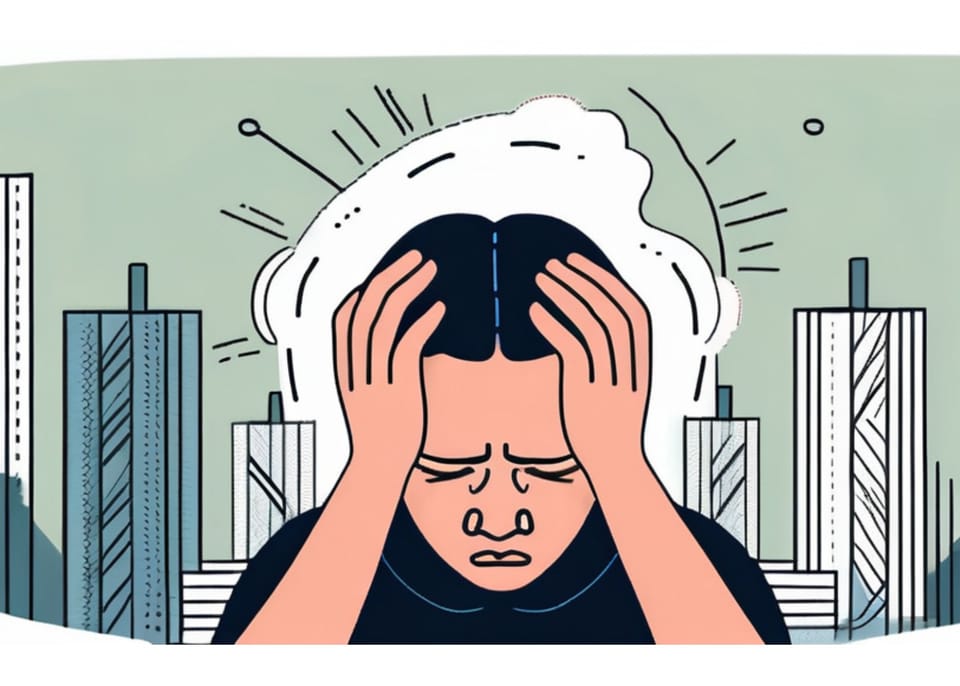Stress-Induced Depression

Feeling overwhelmed, exhausted, and trapped in a constant state of sadness? You may be experiencing stress-induced depression, a condition that affects millions of people worldwide. In this article, we will explore the ins and outs of stress-induced depression, uncovering its causes, symptoms, diagnosis, and treatment options. So, buckle up and get ready to dive into the world of stress-induced depression!
Understanding Stress-Induced Depression
Before we can unravel the complexity of stress-induced depression, it's essential to have a clear understanding of stress and depression themselves. Stress, as we all know, is our body's natural response to challenging situations. But when stress becomes chronic and overwhelming, it can take a toll on our mental well-being, leading to depression.
Stress is a multifaceted phenomenon that can stem from various sources, including environmental factors, internal conflicts, and external pressures. It triggers a cascade of physiological responses in our bodies, such as the release of stress hormones like cortisol and adrenaline, preparing us for the perceived threat. However, when stress persists over an extended period, it can disrupt our body's equilibrium and have detrimental effects on our mental health.
Defining Stress and Depression
Stress can manifest due to various stimuli such as work pressure, relationship difficulties, financial struggles, or even traumatic events. Depression, on the other hand, is a mood disorder characterized by persistent feelings of sadness, hopelessness, and a loss of interest in activities we once found enjoyable.
Depression is not simply feeling down or having a bad day; it is a serious mental health condition that can significantly impact a person's daily life. It can affect how we think, feel, and handle daily activities, making even the simplest tasks seem daunting and overwhelming. Seeking professional help and support is crucial for managing and overcoming depression.
The Connection Between Stress and Depression
Interestingly, stress and depression often go hand in hand, with one fueling the other. When we experience prolonged stress, it can disrupt the delicate balance of chemicals in our brains, heightening our vulnerability to depression. On the flip side, depression can amplify our stress response, creating a vicious cycle that's challenging to break.
This intricate relationship between stress and depression underscores the importance of holistic approaches to mental health. Addressing stress through mindfulness practices, therapy, exercise, and social support can not only alleviate immediate symptoms but also reduce the risk of developing depression. Similarly, treating depression with a combination of therapy, medication, and lifestyle changes can help individuals regain control over their mental well-being and break free from the grip of this debilitating condition.
The Biological Mechanisms Behind Stress-Induced Depression
While stress-induced depression may seem complex, scientists have made significant strides in understanding its biological underpinnings. Let's explore the key factors contributing to this debilitating condition.
The Role of Hormones in Stress and Depression
Hormones, those powerful chemical messengers racing through our bloodstream, play a central role in stress and depression. When stress strikes, the release of stress hormones, such as cortisol, floods our system. Over time, this hormonal barrage can disrupt brain circuits responsible for regulating mood, increasing the risk of developing depression.
Furthermore, the intricate interplay between hormones and neurotransmitters like serotonin, dopamine, and norepinephrine also influences our stress response. These neurotransmitters, responsible for regulating mood and emotions, can be thrown off balance by prolonged stress, contributing to the onset of depressive symptoms.
The Impact of Chronic Stress on Brain Function
Chronic stress doesn't just leave us mentally drained; it also takes a toll on our brain's structure and function. Studies have shown that prolonged exposure to stress can shrink certain brain regions, impairing our ability to regulate emotions effectively. Additionally, chronic stress can impair the production of new brain cells, further contributing to the development of depression.
Moreover, chronic stress can lead to increased inflammation in the brain, affecting neuronal communication and contributing to depressive symptoms. The disruption of neural pathways involved in mood regulation can perpetuate a cycle of stress and depression, making it challenging to break free from this debilitating condition.
Symptoms and Diagnosis of Stress-Induced Depression
If you suspect you or someone you know is grappling with stress-induced depression, it's crucial to recognize the signs and seek proper diagnosis and treatment. Let's delve into the symptoms and diagnostic procedures associated with this condition.
Stress-induced depression is a complex condition that can manifest in various ways, making it challenging to pinpoint. In addition to the common symptoms shared with clinical depression, individuals may also experience physical manifestations such as headaches, digestive issues, and muscle tension. Furthermore, the impact of stress on the body's immune system can lead to increased susceptibility to illnesses and prolonged recovery times.
Recognizing the Signs of Stress-Induced Depression
The symptoms of stress-induced depression may overlap with those of clinical depression. These can include persistent sadness, irritability, changes in appetite or sleep patterns, difficulty concentrating, and a loss of interest in previously enjoyed activities. However, it is important to remember that each individual may experience stress-induced depression uniquely.
Moreover, the effects of stress-induced depression can extend beyond emotional and physical symptoms. Cognitive functions such as memory, decision-making, and problem-solving may also be impaired, impacting daily functioning and overall quality of life.
Medical Procedures for Diagnosing Stress-Induced Depression
Diagnosing stress-induced depression typically involves a comprehensive evaluation by a healthcare professional. They will consider your symptoms, medical history, and conduct various tests to rule out other potential causes. These may include physical exams, blood tests, or psychological assessments to determine the root cause of your symptoms.
Healthcare providers need to take a holistic approach when diagnosing stress-induced depression, considering the interconnectedness of physical, emotional, and cognitive symptoms. By addressing all aspects of the individual's well-being, a more accurate diagnosis can be made, leading to tailored treatment plans that encompass the multifaceted nature of this condition.
Treatment Options for Stress-Induced Depression
The good news is that stress-induced depression is treatable, and numerous effective interventions are available. Let's explore some treatment options that can help lighten the weight of depression's burden.
It's important to remember that seeking treatment for stress-induced depression is a proactive step toward improving your mental health and overall well-being. By addressing the root causes of your depression and learning effective coping mechanisms, you can regain a sense of control and resilience in your life.
Psychotherapy and Counseling Approaches
Psychotherapy, also known as talk therapy, can be a valuable tool in managing stress-induced depression. Therapists can provide a safe and empathetic space for you to explore your thoughts and emotions, helping you develop coping strategies and resilience to navigate life's challenges. Cognitive-behavioral therapy (CBT), dialectical behavior therapy (DBT), and mindfulness-based therapy are just a few examples of effective approaches used in treating stress-induced depression.
Furthermore, therapy sessions can also help you identify and challenge negative thought patterns that contribute to your depressive symptoms. By reframing your perspective and building self-awareness, you can cultivate a more positive outlook on life and enhance your emotional well-being.
Medication and Pharmacological Treatments
In some cases, healthcare professionals may prescribe medication to alleviate the symptoms of stress-induced depression. Antidepressant medications, such as selective serotonin reuptake inhibitors (SSRIs) or serotonin-norepinephrine reuptake inhibitors (SNRIs), can help restore the proper balance of neurotransmitters in the brain, providing relief from depressive symptoms.
It's essential to work closely with your healthcare provider to find the right medication and dosage that works best for you. Additionally, combining medication with therapy can often yield the most effective results in managing stress-induced depression and promoting long-term recovery.
Prevention Strategies for Stress-Induced Depression
While treating stress-induced depression is crucial, adopting preventative measures can help mitigate its onset. Let's explore some lifestyle changes and stress management techniques that may reduce your risk of developing stress-induced depression.
Stress-induced depression can be a debilitating condition that affects many aspects of a person's life. However, by incorporating proactive strategies into your daily routine, you can take significant steps toward safeguarding your mental health and well-being.
Lifestyle Changes to Reduce Stress

Implementing healthy lifestyle habits can have a profound impact on decreasing stress levels and enhancing mental well-being. Regular exercise not only boosts endorphins but also provides a healthy outlet for pent-up tension. A nutritious diet rich in essential nutrients can support brain function and mood regulation. Quality sleep is vital for overall health, as it allows the body and mind to recharge effectively. Finding time for leisure activities that bring you joy and relaxation can act as a buffer against the negative effects of chronic stress.
Mindfulness and Stress Management Techniques
Practicing mindfulness and stress management techniques can equip you with valuable tools to navigate the challenges of life. Mindfulness meditation encourages present-moment awareness and acceptance, helping to reduce rumination and anxiety. Incorporating deep breathing exercises into your daily routine can trigger the body's relaxation response, promoting a sense of calm and reducing stress levels. Journaling allows for self-reflection and emotional processing, aiding in the release of stress and tension. Engaging in hobbies that bring you joy and fulfillment can serve as a form of self-care, nurturing your mental and emotional well-being.
In Conclusion
Stress-induced depression is a complex and challenging condition that can significantly impact our well-being. By understanding the connection between stress and depression, recognizing the symptoms, and seeking appropriate treatment, you can take proactive steps toward managing and alleviating the burden of stress-induced depression. Remember, you're not alone in this journey. Reach out to healthcare professionals, loved ones, and support networks, and let's conquer stress-induced depression together!
Thanks for reading.
BestPharmaReviews.



